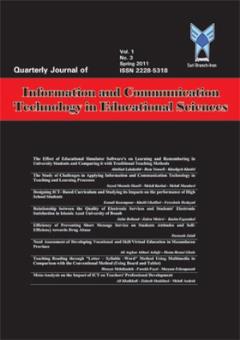The role of artificial intelligence in fostering children's creativity and improving learning
Subject Areas : Infomartion Technology
Naser Mohammadi Ahmadabadi
1
![]() ,
Saeedeh Khavariyan
2
,
Farzane Yazdizade
3
,
Saeedeh Khavariyan
2
,
Farzane Yazdizade
3
1 - Assistant Professor, Department of Psychology and Educational Sciences, Payam Noor University, Tehran, Iran
2 - Master's student in Curriculum Planning, Taft Branch, Payam Noor University, Taft, Iran
3 - Master's student in Curriculum Planning, Taft Branch, Payam Noor University, Taft, Iran
Keywords: : Artificial intelligence, fostering children's creativity, improving education and learning.,
Abstract :
Artificial intelligence (AI), as an advanced technology today, has significant impacts on education. By analyzing data and personalizing educational programs, AI can enhance students' creativity and innovation in problem-solving. However, AI alone cannot replace human creativity and innovation, and students need to strengthen their skills in this area. This article discusses the role of AI in enhancing children's creativity and improving their learning process. A review research method has been used to examine this topic. AI can increase the efficiency and attractiveness of education, helping children improve their concepts. In education, AI plays a crucial role with advantages such as improving teaching quality, collaborative learning, global access, better student assessment, stimulating academic interest, reducing pressure on learners, and easy access to learning. In the field of education, AI can boost children's creativity and academic progress. Educational games, educational toys, and educational computer programs are effective tools for teaching AI to children. Additionally, AI-centered education and learning have various capabilities such as cost and time savings and enhancing students' creativity and motivation. Using AI and innovative educational software can help develop children's creativity and academic progress. These technologies can be used as educational aids to strengthen students' creative and innovative skills effectively. Utilizing AI in children's education can enhance their creativity and critical thinking skills while increasing their readiness for the future. However, attention is needed to address the challenges and limitations of this technology to preserve ethical values and security concerns.
References
Ablhasani, M. A., & Rahmat Khah, M. (2023). Application of Artificial Intelligence in Information Technology. In 19th International Conference on Information Technology, Computer and Telecommunications.
Alian, M., Sajjadi Nasab, F., & Kouhkan, V. (2022). The impact of artificial intelligence and its related tools on increasing students' learning and creativity. In The Fifth International Conference of Psychology, Educational Sciences and Social Studies, Hamedan.
Amani Chalontari, S. (2021). The effect of artificial intelligence on creativity and organizational performance (case study: Shahrekord Telecommunications Company). Public Administration Major, Urban and Rural Development and Progress Management, Payam Noor University, Yazd Branch.
Asna Ashari S.(2023) What is the importance of teaching artificial intelligence to children? Technical Skills Academy for Children and Teenagers,Tehran.
Babashahi, A., Hajilo, M., Nabi Pourmfard, M., & Taheri, Z. (2023). The role of artificial intelligence in creating creativity and increasing students' learning motivation. In 6th National Conference on Management and Electronic Commerce, Tehran.
Bultseva MA, Lebedeva NM. (2021). The role of intercultural competence, in the relationship between intercultural experiences and creativity among students. International Journal of Intercultural Relations; 82: 256-264. doi: 10.1016/j.ijintrel.2021.04.010
Chamani, N., & Abdulinejad, F. (2023). The role of artificial intelligence in the education and learning system. In The Third International Conference on Modern Studies in Humanities, Educational Sciences, Law and Social Studies.
Chen, L., Chen P., & Lin Z. (2020). Artificial intelligence in education: A review. IEEE Access 8(75264-75278).
Ebrahimi, S. (2023). The must and how to teach artificial intelligence for children. In The 7th International Conference on Educational Sciences, Psychology Counseling Education and Research,Tehran.
Esfahani M.B., & Safarabadi N.S. (2022). A review of the use of metaverse systems in education.Teaching and Learning Technology 5(18), 71-96.
Ezni Ashari S.(2023) What is the importance of teaching artificial intelligence to children? Technical Skills Academy for Children and Teenagers,Tehran.
Heydari,M.(2023)The effect of artificial intelligence on children's education.Journal of Psychological Studies and Educational Sciences: Volume 5(48).
Karimi K.(2023)Education of artificial intelligence-how are children educated with artificial intelligence?The 6th National Conference on Management and Electronic Commerce,Tehran.
Leary H., & Walker A.(2018) Meta-analysis and meta-synthesis methodologies: rigorously piecing together research.Tech Trends 62(10),525-534.
Liang W.(2020) Development Trend and Thinking of Artificial Intelligence in Education.Paper presented at the 2020 International Wireless Communications Mobile Computing(IWCMC).
Robati,M.(2023)The history of artificial intelligence in the world Iran from before Christ to 2023;The evolution of artificial intelligence.
Rezvanian,S.(2019)"Artificial Intelligence in the Individual Property System"University Qom;School Law.
Sassani, F. (2021). The role of perception and behavioral intention in artificial intelligence learning. Basir-Abike Institute of Higher Education, Department of Human Sciences.
Tabar, P., Abdi, S., Kanatizadeh Bahmani, M., & Dastan, I. (2023). Artificial intelligence and students' creativity and initiative. In 6th National Conference on Management and Electronic Commerce, Tehran.
Tahmurthy, A., Rafiei, F., Zarei, M., & Afzali, E. (2023). Investigating the use of artificial intelligence tools and facilities to motivate students to learn. Journal of Contemporary Research in Science and Researchers, 5(48).
Tavalai, R. (2023). Interaction between human and artificial intelligence in knowledge management. Organizational Knowledge Management, 6(20), 2-11.
Van Brummelen, J., Heng, T., & Tabunshchyk, V. (2020). Teaching Tech to Talk: K-12 Conversational Artificial Intelligence Literacy Curriculum and Development Tools. arXiv preprint arXiv:2009.05653.
Yordkhani, S. (2023). The role of using artificial intelligence in educational software in the creativity and academic progress of students. In New International Conference of Educational Sciences, Counseling, Psychology and Social Sciences, Hamadan (Eds.), 2nd ed.

